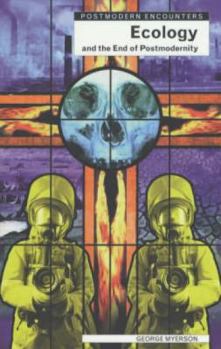Ecology and the End of Postmoderism
(Part of the Postmodern Encounters Series)
In 1979 Jean-Francois Lyotard claimed to have laid the 'grand narrative' to rest. Yet the ecological disasters of recent years Myerson argues, herald a return of the big story, and in a new way are a legitmation, after all, of science. Once again, the minutiae of the everyday are simultaneously part of the bigger picture...
Format:Paperback
Language:English
ISBN:1840462795
ISBN13:9781840462791
Release Date:August 2001
Publisher:Totem Books
Length:80 Pages
Weight:2.25 lbs.
Dimensions:0.3" x 4.4" x 6.9"
Related Subjects
Biological Sciences Biology & Life Sciences Conservation Earth Sciences Ecology Environmental Science Environmental Studies History & Philosophy Movements & Periods Nature Nature & Ecology Philosophy Politics & Social Sciences Postmodernism Science Science & Math Science & Scientists Science & Technology Social SciencesCustomer Reviews
2 ratings
Worth the Afternoon Read
Published by Thriftbooks.com User , 15 years ago
In general scholarship has proclaimed the coming of postmodernism. In the book Ecology and the End of Postmodernity George Myerson instead argues that postmodernism will never happen as Lyotard, Derrida, and others have warned. Instead he argues that with the arrival of Ecology, more precisely the ecological bent of the scientific community, that a new type of modernism has arrived. I would like to explore this idea, as well as imagine how it might affect the study of the Bible. Myerson points out that Postmodernism overturns the idea of Modernism's Grand Narrative, or meta-Narrative. The modernist idea of the onward march of human progress should be thrown away. Myerson uses examples from the Fall-Winter-Spring of 2000-2001 in the UK to show that this indeed has not happened. The news events of that period were reported and understood through the lens of ecology, which "is a point of synthesis, whereas postmodernity envisioned a continuous fragmentation" (30). He says that the new ecological grand narrative is about: - the relationship of man to nature - the responses of the world to our actions - the cycles of pollution and cleansing - health, well-being and sickness - there are episodes, not fragments as proposed by postmodernism - the tension is suspense, not the `indeterminacy' of postmodernism (p44-45) This idea has modernist features: - the view that expertise is needed to find the true meaning of everyday details. Trivial experience has indirect significance, which you cannot `get' through common sense, the direct view. - The disturbing idea that we do not understand the effects of our own actions or intentions. - The negative principle of self-deception: bad-consequences are amplified because they are unacknowledged. We cannot control what we refuse to notice. (p54) I find all of this unique because he actually says "postmodernity is slipping into the strange history of those futures which did not materialize" (74) yet also says, of the new ecology narrative, "Of course this is late modernism - decentered, fluid, and transmitted by the news - but it has exactly the cutting edge of the earlier phase" (70). So his idea of what I will call a "radical modernism" (a term he uses on p74) is vastly different from the classical modernism that one finds in the early 1900's. I would say it is a tempered modernism. One that is not quite so hopeful and admits there are problems which still need to be overcome. It contains a new sort of relationship between democracy and science. Scientific studies can and will be interpreted differently, and the powerful party (decided by polls and politicians) makes the final judgment call. So, while Myerson's idea of a radical modernism is different from the modernism of the 1900's, it also contains elements of postmodernism, without going all the way over the bridge. He is evidently drawing on the ideas of Ulrich Bec
fascinating if flawed speculation of "post-postmodernism"
Published by Thriftbooks.com User , 17 years ago
I love George Myerson's books. His writing -- true "English" -- is lucid, easily readable, and blends the philosophical with the everyday. This book makes the argument that modernism has returned, in the form of ecology and the current earth crises, to replace postmodernism/postmodernity. Myerson assumes some knowledge on the reader's part, failing to define some key concepts, but also does a good job recapping Lyotardian postmodernism specifically (and a little Baudrillard). I'm not sure I agree 100% with Myerson -- he is too dismissive of postmodernism -- but it was refreshing to read someone speculating about postmodernism's successor. He does a good job supporting philosophical, abstract claims with bits from the nightly news. Freud makes an interesting appearance toward the book's end. My only main concern is that Myerson focused too much on global warming and spreadable diseases (BSE; foot-and-mouth) rather than something creeping up on us all: peak oil. Nonetheless, you can replace "ecology" with "peak oil" and Myerson's argument is still valid. (And to his credit he does mention petrol, petrol-economies, and petrol strikes and shortages quite a bit.) I highly recommend this intriguing "little" book. I have read this and "Heidegger, Habermas and the Mobile Phone" by Myerson and am now reading his "Donna Haraway and GM Foods". He is one of the most innovative and brilliant philosophers writing today about philosophy/critical thinking and current events/pop culture.






